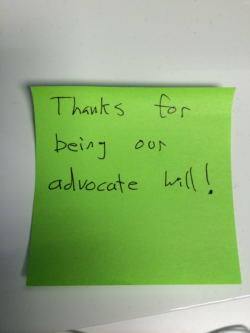Acknowledging Power Distance
Authentic leadership isn’t just about being genuine—it’s about being humane. Leaders must balance their authority with empathy, bridging the gap between their humanity and the power they hold.
Filter by Category
Filter by Author

Authentic leadership isn’t just about being genuine—it’s about being humane. Leaders must balance their authority with empathy, bridging the gap between their humanity and the power they hold.
Posted by Will Sansbury

Save those encouraging notes and emails in a 'For Bad Days' folder. When imposter syndrome hits, pull it out and let those kind words remind you that you are great at what you do.
Posted by Will Sansbury

How I've learned to protect time for deep thinking and doing
Posted by Will Sansbury

Authentic leadership isn’t just about being genuine—it’s about being humane. Leaders must balance their authority with empathy, bridging the gap between their humanity and the power they hold.
Despite the years that have passed and the lessons I’ve learned, I often still feel like that awkward, idealistic eighteen-year-old kid who just graduated high school. From countless conversations with people I deeply respect and admire, it seems all leaders grapple with imposter syndrome, and I’m no exception. I know I’ve been successful, but on the inside, I’m still that goofy ’90s kid with a too-big laugh and an irrational love of flannel shirts.
As I’ve taken on leadership roles, I’ve tried hard to stay authentic and approachable. Yes, I have a position of authority, but deep down, I’m just a regular person trying to make a difference. I’m not scary or intimidating… right?
If only it were that simple. Although I may still feel like that completely unintimidating eighteen-year-old, I now hold power over others. I can impact people’s lives in very significant ways.
While I strive to be approachable and supportive to those I work most closely with, there are others in my organization who I don’t work with that often. To them, I am more a boss than a fully formed three-dimensional human being. For some, interacting with me is like being summoned to the principal’s office or pulled over by the police. No matter how much I try to be genuine and relatable, no matter how much I have the other person’s best interest at heart, my position can trigger stress and anxiety. I want to be oxytocin for everyone, but I am cortisol for many.
Leading with authenticity is about being unabashedly human, but it’s also about being humane—and that requires us to understand that power is threatening, even in the most well-intentioned hands.
So, what can we do to bridge this gap and lead authentically? We can use tactics like skip-level meetings, informal lunches, and practicing “management by walking around” so that our teams experience us as human beings apart from our positions. We can ensure that our interactions with others aren’t always transactional. Ultimately, however, we must acknowledge that it is our job as leaders to be aware of the power distance and to moderate our behavior so that we don’t inadvertently trigger stress or panic in the people we support.
Cover photo by Scott Rodgerson on Unsplash

I have a working theory that most companies struggle to distinguish between true leaders and charismatic laborers. The charismatic laborer is easy to celebrate. They march home...

Here’s a random story and thought from my drive into the office today, likely sparked from my current audio book, Humanocracy: Creating Organizations as Amazing as the...